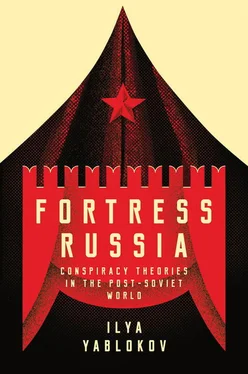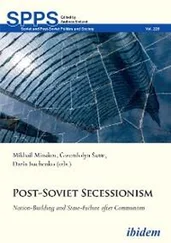1917–1991: Nikolai Starikov’s Interpretation of the Soviet Collapse
In the huge body of Russian conspiracy theories of the 2000s, the works of Nikolai Starikov occupy a particularly important place due to the popularity of the writer and to his insistence that the West is actually engaged in a war with Russia. By 2017 he had sold over a quarter of a million copies of his books. He regularly travels round Russia giving lectures and book presentations, and he takes part in television shows. In 2011, he became actively involved, together with Kurginian, in Russian political life: he is now a leader of the movement Profsoiuz grazhdan Rossii (the trade-union of Russian citizens) and the head of the Great Fatherland party (Partiia ‘Velikoe Otechestvo’).
Starikov’s method of studying Russian history is typical for a conspiracy theorist: ‘Many things in our history become clearer if you try to look behind the curtains of world politics. The aspirations of states and nations are always similar – nothing changes in the geopolitical causes of conflicts and wars. You only need to catch the correct logic of events and then you can easily understand both the past and the future’ (Starikov, 2009, pp. 9–10). This is how Starikov discovered the Anglo-Saxon conspiracy against Russia that caused the revolutions both of 1917 and 1991:
When I understood that the February and October revolutions were both part of the British intelligence to [bring about the] collapse [of] its geopolitical rival, the signs of repetition of the same scenario at the end of the twentieth century became obvious to me. It has become especially evident during the August events of 1917 and 1991… (2011e)
In Starikov’s view, the USA and the UK have always been engaged in a war against Russia because of its vast territory and abundant natural resources. He considers (2010a) that Russian revolutionaries represented the geopolitical interests of Russia’s enemies and undermined Russia’s greatness and political stability purely for financial gain. The events that took place in the CIS countries in the 2000s were an extension of the model which was implemented by the West both in 1917 and 1991:
We witness all sorts of velvet, rose, and orange revolutions… [Behind] the curtains of unrest in 1917 [in Russia] stood foreign intelligence services. Strikers also need to eat something and it means that someone must pay for that. Those who are interested [in Russia’s collapse] will pay. This is a simple idea and something that historians and politicians make wrong conclusions about although they initially might have correct assumptions… The answer to the question ‘Who was the historical and geopolitical enemy of the Russian empire?’ is the answer to the question about the mysterious author of our revolution. (Starikov, 2009, p. 48)
Just as in 1917, the Soviet collapse was supposedly the result of the global operation of British and American intelligence, together with a mass betrayal of Russia by top-ranking Soviet officials. In 1985, almost at the same time that Gorbachev was appointed General Secretary of the CPSU, Saudi Arabia increased its petroleum production and dramatically brought down oil prices which caused enormous economic problems for the Soviet Union. Saudi Arabia engaged in this financially unprofitable action to gain economic advantages from the United States (Starikov, 2010b). The reference to the oil price is key: indeed, the drop in the oil price, as well as the agreement between the USA and Saudi Arabia, played important roles in the Soviet collapse (Gaidar, 2007).
Yet Starikov’s rant against Gorbachev emphasizes that some members of the political elite might also be dangerous for Russian statehood. The Soviet collapse was possible only when the US leadership realized that the new Soviet leader, Mikhail Gorbachev, could destroy the country he was leading (210b, p. 80). By the end of 1991, due to his destructive actions, the USSR was on the brink of total collapse because it had lost almost all sovereignty. Diplomatic sovereignty was replaced by friendship with the West; military sovereignty was lost when Gorbachev destroyed the Soviet army; economic sovereignty was demolished by selling out Soviet industrial potential; and cultural sovereignty was exchanged for ‘alien’ Western values (2011c, pp.16–17).
Mikhail Gorbachev as a Favourite Scapegoat
Starikov’s attack on Gorbachev is not unique; the first and last Soviet President is seen by many commentators as someone who consciously contributed to the collapse of the Soviet Union. In the early 1990s the Soviet writer and political émigré Aleksandr Zinoviev wrote that Gorbachev started the epoch of ‘great treason’ by visiting Queen Elizabeth II at Windsor Castle in 1985 instead of paying his respects at the grave of the founder of Communist ideology, Karl Marx, in Highgate cemetery (Zinov’ev, 1995). This ‘treason’ label was attached to Gorbachev in all the conspiracy writings about the Soviet collapse. While acknowledging that the economic situation in the USSR had not been good, various authors (including those who were Gorbachev’s closest aides) claimed that he had deliberately destroyed Soviet military strength and got rid of political rivals in exchange for the support of the West. Anatolii Luk’ianov, Chairman of the Supreme Soviet of the USSR, wrote that there were no ‘objective prerequisites’ for the demise of the USSR, but this happened because of a struggle between irresponsible politicians, with Gorbachev playing one of the leading roles (Luk’ianov, 2010). Russian historian Anatolii Utkin asserted that Gorbachev committed a crime against the Motherland by allowing Ukraine to declare its independence, which destroyed forever any hope of Russia regaining its imperial greatness. Gorbachev agreed to everything that his American partners suggested, Utkin argued, thereby betraying the geopolitical interests of Russia (Utkin, 2009, pp. 30–2, 199).
In November 1991, Viktor Iliukhin, a top-ranking official in the USSR General Attorney’s office, filed a lawsuit against Gorbachev accusing him of high treason, planning the collapse of the state at the behest of the USA, and signing decrees that contravened the Soviet Constitution and state laws (Iliukhin, 2011). Iliukhin did not win the case and was dismissed from his post. At the end of 2011, however, Starikov filed another lawsuit against Gorbachev, charging him with the collapse of the Soviet Union, the disappearance of the country’s gold reserves, the destruction of the army and the pauperization of the population.
Starikov’s attack against Gorbachev was a response to the fact that Gorbachev criticized Kremlin policies under Putin (Telen’, 2009). He argued that since Gorbachev did not repent of his sin of destroying Russia in 1991, he had no right to criticize Putin and other ‘patriotic’ politicians (2011b). It is important to note that Starikov’s words were later reiterated by the Kremlin spokesmen. Amidst the protests in Moscow in 2011–12 by opponents of Putin and the United Russia party, Gorbachev criticized Putin and the fact that he was running again for president (Dymarskii et al., 2011). Putin’s spokesman Dmitrii Peskov replied that ‘the former head of the huge country, who basically destroyed it, suggests to another man, who managed to save Russia from the same fate, to resign’ (Russkaia sluzhba BBC, 2011). More recently, in April 2014, several deputies of the State Duma asked the General Prosecutor of the Russian Federation to open the case against Gorbachev which charged him with triggering the collapse of the Soviet Union (Runkevich and Malai, 2014).
Gorbachev’s role in the collapse of the USSR is really hard to underestimate. The reforms he launched in 1985 were key steps in the process of democratization and, in many ways, undermined the legitimacy of many symbols that held the Soviet regime together (Gill, 2013). However, despite the revolutionary nature of his reforms, many commentators argue that it was not his intention to dismantle the Soviet Union. On the contrary, he did his best to preserve it (Brown, 2011; Plokhy, 2014).
Читать дальше
Конец ознакомительного отрывка
Купить книгу












